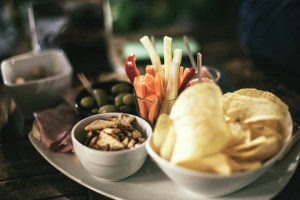
Much like a car, your body cannot run on an empty tank. In particular, your brain will work better if you’re properly fueled. That is to say, properly fed. The brain uses up to 20 percent of the calories you consume every day, so skipping meals could cost you points off your grades!
It’s quite all right to snack while you’re studying, and snacking right might just help you give correct answers in class. That’s because certain kinds of food have key nutrients that can improve how your brain works, and help you get more done as well.
Here are some scrumptious study snack suggestions along with some snacking strategies for you to digest:
1 Keep them small and steady. Having small meals frequently will keep your blood sugar and energy levels steady, which means you won’t have to binge to get pumped come study time. Snack food alone can’t power you up as much as a real meal can. Suggestions for small meals include bean soup, cold cut sandwiches, ready-to-eat tuna, and chicken salad.
Instant noodles and fast food aren’t the best choices for small meals. Instead, try whole grain cereal, whole wheat bagel, turkey wrap, baked potato, sweet potato fries, whole wheat pasta, soft taco, multi-grain waffle, sandwich on whole wheat or an omelette. High protein options to raise your neurotransmitter levels include cheese, eggs, and plain yogurt.
2 Slash the sweet and sugary. If your sweet tooth starts kicking in, try berries—these antioxidants and phytonutrients improve blood flow to the brain to help it work better. Dark chocolate does the same. It also boosts endorphin production to keep your spirits up. Tuna on whole grain crackers and nuts and seeds have fatty acids to keep your brain working at peak levels. Sunflower seeds helps keep your mind alert, while nuts have iron and oxygen to boost memory.
Peanut butter also has a lot of brain-boosting nutrients such as protein and healthy fats. Other candy alternatives include fruit salad, avocados, roasted chickpeas, granola bars, dried apricots, oranges, raisins, and pomegranates. Apples are some of the best fruits you can eat while studying. Low-sugar breakfast cereals are also healthy choices that can keep you full as you work.
3 Curb the caffeine, go H2O. Coffee and study have traditionally gone together like creamer and, well, coffee—but chugging caffeine during an all-nighter comes with drawbacks such as trouble sleeping after your study session. Caffeine can also come in the form of soda or energy drinks. Cut back on the coffee if you can’t cut it out altogether, or for a change, try tea.
Water is still the best thing to drink while studying—a liter of water every two hours is ideal for maintaining your energy, and drinking it cold can keep you alert. The brain is 78 percent water, after all, and needs to stay hydrated for it to work its best. If you’ve had your fill of water, try cranberry juice, orange juice, skim milk, or soy milk.
4 Stock up, but stand up. Keep your study area stocked with healthy study snacks, which can also include frozen juice bars, oatmeal, low-fat popcorn, and nutrition bars loaded with protein—but don’t put them within reach. It’s a good idea to get up and go to where you can snack, away from your desk.
Just remember that junk food, milk chocolate, energy drinks, and chips aren’t just harmful to your health in the long run, they might even make a bad impact on how well you do in class.